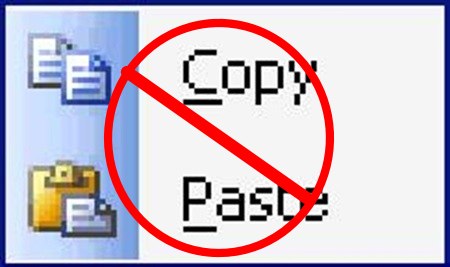Blogging Commandments: Don’ts to Abide by
This article was updated on August 6th, 2020 at 05:57 am
Starting a blog requires a lot more than meets the eye, especially the novice’s eye. All the interesting stuff you read on the web isn’t something bloggers just dream up and start going tapity-tap on the keyboard.

Good blogging requires a great deal of trial and error, as well as patience and the ability to really get in touch with your inner-intellect and the audience’s needs. It’s also a great learning experience for budding writers who have a thing or two to share with everybody as far as a hobby or extensive knowledge on a particular subject is concerned.
We’re going to discuss some common mistakes, traps if you will, that novice bloggers tend to fall in. Even though there’s no guarantee you won’t fall into them yourself at some point, at least you’ll approach problems and challenges with a more cautious and self-aware stance, while making the most of your learning experiences.
Don’t be a Copycat

If your content doesn’t come off as genuinely unique, people will have little reason to check out your page on a regular basis. Even though at some point, you might find yourself rehashing some content people may or may not already be aware of, it is important to infuse your unique take and approach on the subject matter.
If you’re under the notion that it’s okay to recycle trending stories and stick them straight into your blog, it isn’t. It is however, okay to borrow content from a few sources and add your own angle and opinion to it. In most cases, you should mention those sources.
People love opinions, debates and a little bit of controversy. Use that to your advantage. Providing intelligent conclusions at the end or speaking of the underlying moral will always have readers coming back for more.
Don’t Overlook Legal Issues

Make certain mistakes, and you might find yourself tripping around in a legal minefield. Look at it in terms of trademarks, copyright, illegality and defamation. And you certainly don’t want to trip over this mine: going with research sources while failing to back it up with at least two or three other sources, adding hearsay like there’s no tomorrow.
If you’re not entirely sure, it’s always good to include multiple sources that complement your assertions. Take a look at the Electronic Foundation Frontier to get to know some legal information pertaining to blogging.
Don’t Just Copy/Paste Any Writing Style
When it comes to blog-writing, you need to approach it with a fairly open mindset. If you’ve been writing articles using a technical, formal or academic style, all that must go out the window. Blog writing is strictly conversational, and informal in pretty much all cases. You’ll be peppering it down with your own opinion, no matter how outrageous it may seem, but it needs to be something interesting, something that strikes a chord or two with the audience.

The best-suited writing style comes down to your audience and what kind of content they like reading. Even if you are writing a technical blog, let’s say on the latest mobile technology or apps, you’ll still need to be mindful of your audience: use terms and lingo they can digest easily.
It’s best not to preach to your readers, as they expect you to see things at the same level as they do, eye-to-eye so to speak, which isn’t asking a lot, really. What they don’t want is being scorned, scolded or insinuating that you’re the superior authority. Audiences generally love bloggers who are down to earth and like sharing foibles regular people experience in their daily lives. Add to that a sense of humor which goes a long way in terms of winning over your reader.
It’s easy to fall prey to writing political blogs filled with rants or intolerant tirades. Exercise some common sense and always maintain a somewhat formal and serious tone. There’s no need at all to resort to defamatory comments or name-calling.
Cussing or swear words should generally be avoided in all situations. Even if it seems to fit well with the context or theme of your blog, it is best advised not to use any “cheap” language. It’s fine to let off some steam in a blog, however, swearing and random cursing will certainly putt off readers, especially the more like-minded ones.
Don’t go Mute after Writing Your Blog
Social media & Email are your friends. In fact, they’re your best friends. Use popular channels like Tumblr, Twitter and Facebook to spread the word. Visit others bloggers’ pages and when you leave comments and leave a link to your blog in a “matter of fact” way. You’ll be known as someone who expresses genuine interest in what other bloggers have to say, and eventually, they’ll be happy to return the favor when the need arises.

It’s always a good idea to check with the blogger’s comment policies though as some of them prohibit readers from leaving links that drive away traffic or lead to other blogs.
Similar with emails, outreach to your fellow bloggers with best available outreaching or auto-responder tools to get the most out of it. Always remember, Email Marketing will never be old school!
Don’t Discourage or Ignore Comments
You may have many wise words to tell the world, but what’s it all matter if your readers are not prompted to leave comments? Always keep your comments feature open.

Comments are a kind of pulse on your blog; whether people have positive or negative things to say about the content, at least they’ll start talking about it, and that sells big time on the internet. A really good blog will get people to discuss both sides of the story, and that’s an ideal situation: more traffic to your page.
Your readers should always find it easy to leave comments. They shouldn’t have to jump through hoop after hoop. The line between signing in and using CAPTCHA fixes has to be finely balanced. They should be able to leave comments right away, without the need for providing any personal information.
At the end of your post, leave a line or two, ask for thoughts and/or feedback, encouraging readers to leave comments, suggestions and their experiences.
As soon as you start seeing comments, you should respond without any delays. It is not only a polite gesture, but also builds feelings of trust and credibility between yourself and your readers. It lets them know that you care about engaging with them. An exception is spamming or ‘flame wars’ between readers, in which case, it’s your responsibility to leave the appropriate comment so as to resolve the dispute or remove it altogether.
As far as spam goes however, you should remove it indefinitely. It doesn’t look very professional. Find a program that keeps spam away from your blog.

